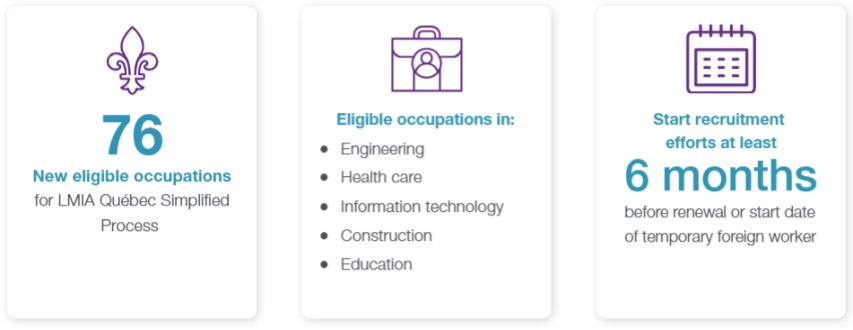- within Consumer Protection, Food, Drugs, Healthcare, Life Sciences and Intellectual Property topic(s)
- with Senior Company Executives, HR and Finance and Tax Executives
- in Canada
- with readers working within the Accounting & Consultancy, Banking & Credit and Insurance industries
A new list of the occupations eligible to the facilitated Labour Market Impact Assessments (LMIA) process required for issuance of work permits under the Temporary Foreign Worker program for foreign workers destined to the province of Québec was issued by the Ministère de l'immigration, de la Francisation et de l'Intégration (MIFI) on Feb. 24, 2025.
Québec-based employers must take good notice of the reduction of occupations eligible to the facilitated LMIA process, identify the sectors still permitted to proceed through the province's simplified process, and plan their foreign workforce's immigration status renewal and recruitment efforts accordingly.
Key takeaways
- The number of occupations eligible to the Québec facilitated LMIA process was reduced from 267 to 76.
- Managerial-, intermediate- and labour-level jobs (TEER 0, TEER 4 and TEER 5) are no longer on the simplified process list.
- Sectors of new eligible professions include engineering, information technology, health care, construction, and education.
Facilitated LMIA process for Québec
The Temporary Foreign Worker program enables Canadian employers to hire foreign workers to temporary fill positions for which there is a demonstrated shortage of qualified Canadian candidates.
Through this program, the employer must submit an LMIA application and comply with a number of requirements, such as respecting the prevailing wage for the position offered at the job location, offering private health insurance covering any period of time the foreign worker is not insured by the applicable public system, paying all processing and recruitment fees, and demonstrating shortage of Canadian candidates by conducting specific recruitment activities. Once the LMIA is approved in favour of the foreign candidate, the latter can apply for a Canadian work permit.
A facilitated process has been put in place by the Canadian immigration authorities to fast-track occupations for which a shortage has already been established. Under this process, employers are not required to include proof of their recruitment efforts in their LMIA application, which can reduce the cost and length of the process by exempting them of the usual 4-week mandatory job posting.
In the province of Québec, the list of professions eligible to the simplified process also guarantees a speedier processing time of the LMIA application by Service Canada. Up until Feb. 23, 2025, this list was relatively generous: it included 267 professions of all levels of Training, Education, Experience and Responsibilities (TEER), and from various industry sectors.
On Feb. 24, 2025, the Québec government took steps to reduce the number of temporary foreign workers in the province by cutting by almost 75 per cent the list of professions eligible to the simplified process, now only allowing 76 occupations to benefit from it.
Québec's new list of eligible occupations
The updated list of eligible occupations includes professions in the following fields:
- Engineering
- Civil, mechanical, industrial engineers
- Technologists and technicians
- Health care
- Social workers
- General practitioners
- Specialists including psychologists, physiotherapists, occupational therapists
- Nurse practitioners, registered nurses, practical nurses, physician assistants
- Pharmacists
- Information technology
- Programmers
- Systems analysts
- Software engineers
- Construction
- Electricians
- Welders
- Machinists
- Education
- Early childhood educators and assistants
- Kindergarten teachers
- Primary school teachers
- Secondary school teachers
- Food industry
- Cooks
- Butchers
- Bakers
- Food service supervisors
It should be noted that this new list uses the National Occupation Classification (NOC) of 2021. The NOC is Canada's national system for describing occupations. Each occupation has a NOC code, but each NOC code includes several job titles. All the occupations eligible to the Québec simplified process specify the NOC code they belong to, but some bear an asterisk. The asterisk indicates that only that job title is eligible rather than all the titles under the said NOC code.
In addition to the reduced number of eligible positions, the list no longer includes any managerial occupations (TEER 0), intermediate jobs that usually only require high school or job-specific training (TEER 4), or labour jobs with no minimal education (TEER 5).
Impact on Québec employers
This reduced list of occupations eligible to the Québec simplified process will have a significant impact on Québec employers wishing to address their labour shortage using temporary foreign workers.
Employers intending to renew their current temporary foreign employees' immigration status, or hire a new foreign candidate requiring a LMIA-based work permit, will:
- have limited access to this fast-track process;
- no longer be able to use the process for managerial, intermediate and labour jobs;
- need to increase their recruitment responsibilities; and
- face lengthier processing times for their LMIA applications under the regular stream.
In light of these recent changes, Québec employers will need to become more strategic with their workforce planning, and properly explore their immigration options such as the International Mobility Program (IMP), where a work permit application is exempt from including an LMIA approval. These employers will also have to adjust their hiring strategies.

Practical advice
- Advice #1: Québec employers should start the renewal or recruitment process at least 6 months prior to the expiry of a foreign worker's work permit or a foreign candidate's start date.
- Advice #2: Québec employers should explore all immigration options in order to establish if the position offered to a foreign candidate requires an LMIA, and if it can be fast-tracked.
- Advice #3: Québec employers should stay informed of the numerous changes made to the immigration programs and processes by consulting immigration experts.
The content of this article is intended to provide a general guide to the subject matter. Specialist advice should be sought about your specific circumstances.



